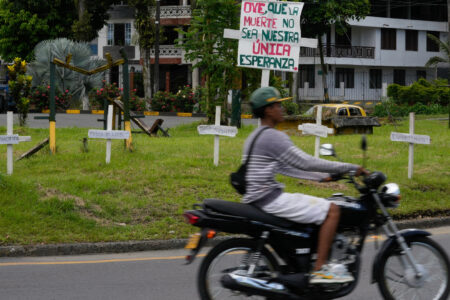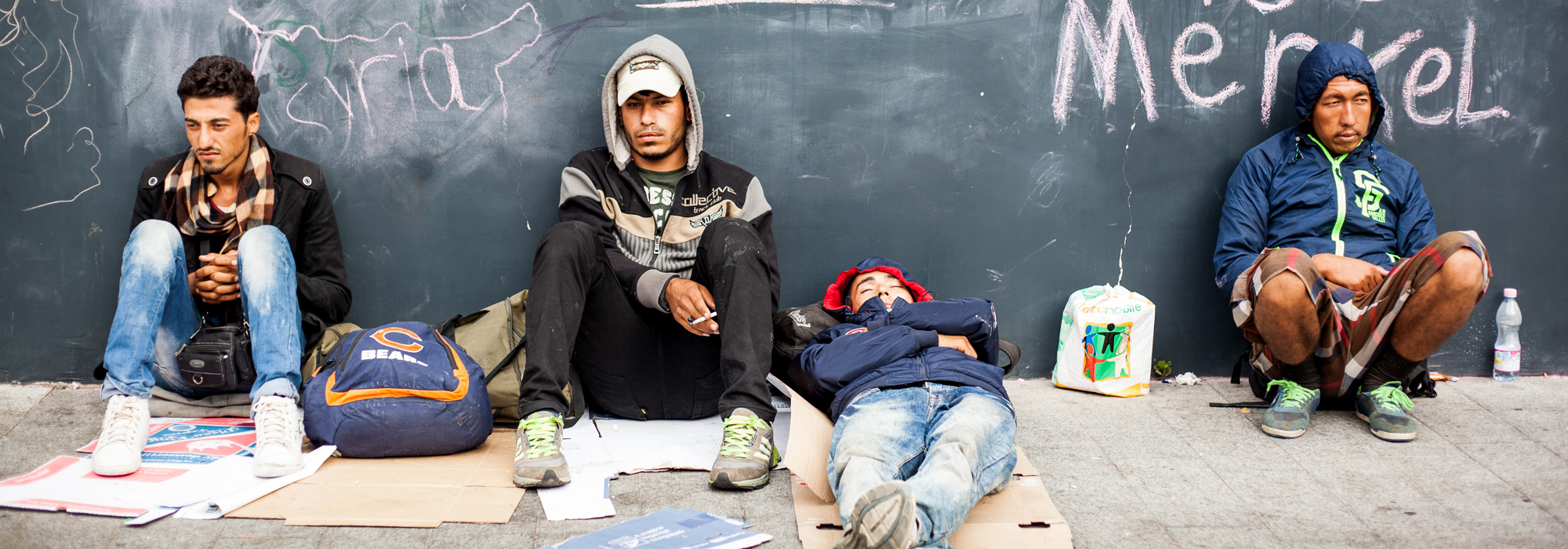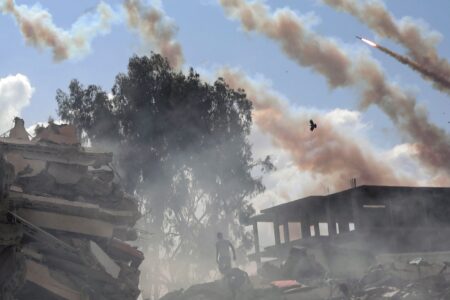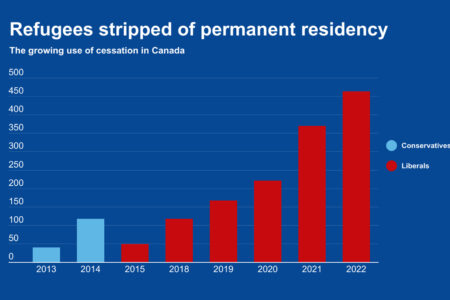
Over the weekend, we learned that Canada is—finally—taking decisive action to get Syrian refugees here more quickly. “Thousands more” will be arriving before the end of the year, thanks to the deployment of additional diplomats to handle forward screening, and the crucial decision to presume that Syrians are convention refugees—that is, they are considered refugees under international law—rather than insisting on proof that the United Nations Refugee Agency has certified them as such. Though Chris Alexander, minister of citizenship and immigration, went out of his way to stress that the total number would remain capped at 10,000 it’s still an important step forward.
Great! Now, what else can Canada do to help? Lots, as it turns out.
First, we can let in more refugees, and should do so as soon as possible. We can do considerable concrete good in helping refugees, so that’s a good place to concentrate efforts. Whether we consider the issue in absolute or comparative terms, Canada ought to do more for the world’s ballooning population of displaced persons. Four million Syrians now have fled their country. Eight million more are displaced within it. And that’s just one country.
An astonishing 59.5 million people have been displaced globally, driven from their homes by conflict and persecution in places like Afghanistan, Somalia, and the Sudans. The need is enormous and goes far beyond the human tide created by the Syrian war. Canada’s contribution, however accelerated, amounts to little more than a rounding error in comparison with the numbers accepted by Germany.
Moreover, arguments against accepting additional refugees are weak. The claim that Canadians must choose between kindness and security on this front is not credible for various reasons others have laid out. The security risk posed by refugees is low. Even if it weren’t, the government has made clear its commitment to thorough screening. Indeed, in the words of Alexander, security remains the government’s “top priority.” We’ve successfully integrated waves of refugees before, and we can do so again.
Accordingly, Canadians ought to pay serious attention to bold yet pragmatic visions on refugee acceptance forwarded by Rick Hillier, Romeo Dallaire, Scott Gilmore and others. We can do more, and so we should do more.
Still, accepting more refugees is just one dimension of this crisis unfolding across three continents. What else can and should Canada be doing? The vast majority of refugees remain in the countries immediately surrounding their states of origin. At the end of 2014, Turkey alone hosted more than 1.6 million refugees. As all are now aware though, more and more are looking further abroad for safety, driving the mounting crisis in Europe.
There are practical ways to Canada can help address some of these other areas of refugee need. For instance, we might also work with others to strengthen the international refugee system. Money would help in this regard, of course. The UN’s humanitarian agencies are running out of funds to cope with the crisis. Some refugees are in danger of losing their food aid. Towards that end, the government announcement to match donations to Canadian charities is welcome, but we ought to consider greater funds for the UN agencies and the World Food Program as well. These organizations constitute the backbone of the global humanitarian response.
Other cracks are showing in the system as well. Italian and Greek navies are stretched beyond their limits patrolling the Mediterranean and Aegean seas for foundering boats laden with refugees. Canadian assets, old and dilapidated as many of them are, might help in that effort, reducing the number of such tragedies as a result. Better still, Canada could work with European powers to hire more boats to ferry people—both Syrians and non-Syrians—across, taking the human smugglers and their dinghies out of that part of the equation entirely. If they’re going to come anyways, then the humane thing to do is to make the trip a safe one.
Beyond refugee assistance, broadly understood, what options are there? The debate in Canada has been consistently framed as a sort of humanitarian-guns-or-charitable-butter choice between fighting ISIS on the one hand, and accepting refugees on the other. Discussions along those lines implicitly reinforce a widespread misconception in Canadian discourse, namely that fighting ISIS is part of the solution to the conflict in Syria, that in some way it addresses the “root causes” of the war there. It isn’t, and it doesn’t.
It is true that the fight against ISIS provides some humanitarian relief to Kurds and others on the borders of the Syrian war. Likewise, it responds to a perceived threat to Canadian national security. These are valuable ends. At the same time, it does little to stem the flood of Syrian refugees.
Syrian President Bashar al-Assad, not ISIS, bears the brunt of the blame for the country’s suffering. As odious as ISIS is, it is just one faction among several in the region vying with both Assad and one another for power; neutralizing it does little to end the war in Syria. So long as Assad continues to fight for control, the carnage there will continue, as will the steady stream of those fleeing the violence.
Should he hold on to power, it would constitute a mockery of the idea of an ethical, rule-governed world, yet it’s not clear what opposing force might be assembled to bring him down, much less replace his regime. It’s the kind of situation where the differences between “realist” and more values-based approaches to foreign policy may be irreconcilable. This is one of the central problems facing the international community; if Canada wants to be (and be seen) as a global leader, then it must grapple with it directly in cooperation with its allies.
In the past, one of Canada’s most natural contributions would have been precisely in this vein: engaging in active and creative multilateral diplomacy with other like-minded countries in the search for some larger solution to the separate but connected problems of Syrian war and refugee flight. For the moment, there is no clear path to a resolution of the conflict in Syria—indeed, the recent appearance of Russian forces in Syria makes the situation even more complex and dangerous, given that Assad is a long-time Russian ally—but that is a reason to work harder in the search for one, not to avoid the issue.
Moreover, even in the absence of a clear path to peace, there are other roles for Canadian diplomacy, military, and assistance programs to play. One proposal that has come up a number of times in the past year, for instance, calls for the establishment of a no-fly zone near the Turkish border. With the support of Turkish troops on the ground it might even be possible to begin planning for the return of some Syrian refugees to their homeland, though it’s not yet clear how or when such a mission might end.
Alternatives include focusing on providing training and support for local forces, though the results of US efforts on these lines have thus far been discouraging, to say the least. A training program expected to turn out 5,400 trained Syrian fighters per year currently has “four or five” graduates still on the ground and in combat roles.
In short, there are significant problems with all potential options, but that is where the conversation must go in Canada if we are serious about acting to end the suffering of Syrians.
Last Wednesday, a little boy whose name everyone now knows died along with his brother and mother off the coast of Greece. The resulting picture served to issue a moral challenge confronting Canadians. To their enduring credit, Canadians responded not by asking, “have we done enough”, but rather “what more can we do?”
If we are to give meaning to that senseless loss, and to honour the generous outpouring of sentiment that followed, we must engage in an honest discussion about what must be done, what can be done, and what ought to be done in the face of this complex crisis.
Photo: Istvan Csak/Shutterstock







